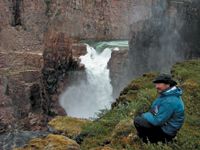Up a river without a paddle
We wondered aloud over the din of the roaring river if these rapids were runnable.
Terri and I had been married for a few weeks as we gazed at a section of white water cutting through the red granite in Quebec's Parc de la Verendrye. We wondered aloud over the din of the roaring river if these rapids were runnable. We'd survived four years of veterinary school and we'd just opened a clinic together. We had overcome many obstacles in our relationship and felt the confidence of youth—so we took the plunge and ran our first set of rapids. Flawlessly.

Deep plunge: Dr. David Plante takes in the view at Wilberforce Falls on the Hood River, the tallest waterfall north of the Arctic Circle. (PHOTO COURTESY OF DR. DAVID PLANTE)
From then on we canoed the rivers and lakes of northern New York, Maine, Quebec, and Ontario. Several years later, our practice had grown. Our clinic was too small so we decided to build anew, and I had to give up paddling because of some challenges that came up during construction. When the new practice was finished, I decided to go on the wilderness trip of a lifetime with a commercial canoe-trip company in Canada.
As my group's float plane descended on the mountains of Canada's Northwest Territories, the pilot cautioned us: One of the last paddlers on Mountain River had died. We felt both apprehension and exhilaration as we deplaned. This was my first canoe trip in the far north—and almost my last.
On the second day of our trip, we were running a set of rapids through small canyons when suddenly the river turned and narrowed. Just a few meters ahead stood a large grizzly bear, blocking our passage. We had little time to react. My partner and I yelled and blew whistles. Seconds before impact, the bear decided to run. We took a second to catch our breath, and then moved deeper into Mountain River.
By the second week, the cold rain had become incessant and the river swollen. We approached the infamous third canyon with the pilot's words in our minds. The first canoe went ahead as a safety boat. The second canoe followed, but flipped in the turbulent water. I was in the last canoe, so we set off to rescue our friends, who had swum to a small gravel beach along the cliffs. As my partner and I tried to retrieve equipment, our canoe capsized. The 45-degree water penetrated my wet suit and took my breath away. I lost sight of my partner, but I was determined to stay with the canoe. For nearly four miles, I was swept down the rapids. It was impossible to right the canoe. Hypothermia was inevitable.
In the frothy distance I could see a gravel bar in the center of the rapids. I grasped the painter line on the end of the canoe and swam with all my might to turn the canoe perpendicular to the gravel bar. Fortunately, the canoe slammed into the small oasis and I was safe—for a moment. I stood up only to realize my legs were numb. Luckily, the team in the first canoe had chased me and landed on my island. They helped me set up a tent and I was soon unconscious in a sleeping bag while they went back to rescue our friends trapped in the canyon.
I woke suddenly when I felt water creeping into my sleeping bag. I crawled out of the tent and saw that the river levels were rising, which meant my island was shrinking. I moved the tent to dry ground and checked the time. I had been on the island for nearly 11 hours, and it would soon be dark. I weighed my options, beginning to feel that my oasis had become a death trap. I had a canoe but no paddles.
The team from the first canoe found my partner upriver in a state of hypothermia. Once they'd stabilized him, they continued on to the canyon and climbed to the rim above our trapped friends. My partner made a makeshift harness and rappelled down the cliff. Once he reached our friends, they all climbed a crack in the cliff to safety. At 1 a.m. I saw two canoes in the distance, and soon we were all reunited.
What an adventure! Fortunately, this outing wasn't typical. I've guided over 30 trips without incident. Most paddlers, if they've done it long enough, have stories like this to tell.
—David Plante, DVM
Watertown, N.Y.